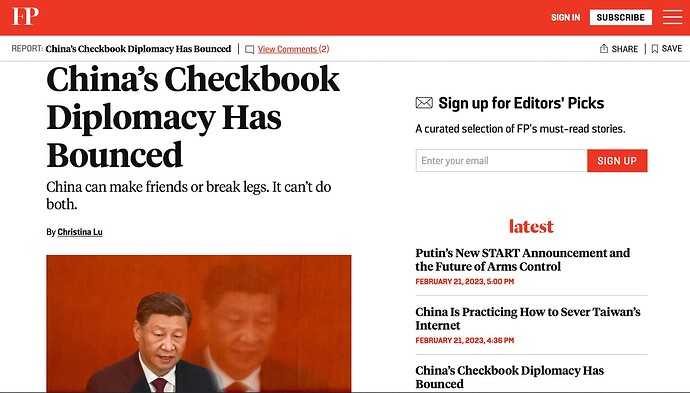-
通过 "一带一路 "倡议,中国已成为发展中国家基础设施贷款的首选银行。
-
北京现在发现,其借款人未能偿还贷款,迫使它成为一个强硬的执行者,并危及 "一带一路 "等倡议所建立的善意。
-
追逐未偿还的债务不会赢得很多朋友,这使中国政府通过经济交易扩大其影响力和建立新关系的更大愿望变得复杂。
-
BRI在2013年被公布为一项雄心勃勃的基础设施发展运动,将横跨约140个国家,但在实践中,该倡议并不那么精简,而且更加不透明。
-
BRI在很大程度上是对中国国内经济挑战的回应,国内产能过剩找不到合适的出路。
-
2017年,中国超过了世界银行和国际货币基金组织(IMF),巩固了其作为世界上最大债权人的地位,尽管中国政府后来缩减了其贷款。
-
它的许多借款国仍在努力将其经济从边缘拉回来,无力偿还中国。
-
中国将自己置于一个困难的境地,因为其主要政策性银行的金融利益与中国的外交利益相抵触。
-
一些资金紧张的政府正在推动债务减免、豁免或重组,使中国政府陷入困境。
-
赞比亚在2020年拖欠了大约170亿美元的债务,中国是其最大的双边债权人,而两国之间曾经糟糕的关系已经变质。
-
斯里兰卡是另一个被膨胀的债务压得喘不过气来的借款国,中国政府给了科伦坡一个缓和的机会,但它没有为国际货币基金组织的介入提供必要的融资保证。
-
随着中国在追讨债务方面变得更加激进,它有可能损害其作为仁慈的金融家的形象,并危及其外交关系。
-
China has emerged as the developing world’s preferred bank of choice for infrastructure loans through the Belt and Road Initiative (BRI).
-
Beijing is now finding that its borrowers are failing to pay back the loans, forcing it to become a tough enforcer and jeopardizing the goodwill built by initiatives such as the BRI.
-
Chasing down unpaid debts won’t win many friends, which complicates Beijing’s broader aspirations of extending its influence and forging new relationships through economic deals.
-
The BRI was unveiled in 2013 as an ambitious infrastructure development campaign that would crisscross some 140 countries, but in practice, the initiative was less streamlined and more opaque.
-
BRI was in large part, a response to China’s own domestic economic challenges, where an excess of domestic production capacity could find no easy outlet.
-
In 2017, China surpassed the World Bank and the International Monetary Fund (IMF) to cement its position as the world’s biggest creditor, although Beijing has since scaled back its lending.
-
Many of its borrowers are still battling to pull their economies back from the brink and are unable to pay China back.
-
China has put itself in a difficult position because the financial interests of its key policy banks trade off against its diplomatic interests.
-
Some cash-strapped governments are pushing for debt relief, forgiveness, or restructuring, putting Beijing in a bind.
-
Zambia, which defaulted on some $17 billion of debt in 2020, counts China as its largest bilateral creditor and the once-rosy relations between the two countries have soured.
-
With Sri Lanka, another borrower buckling under the weight of its ballooning debt, Beijing has granted Colombo a reprieve, but it has not provided the required financing assurances for the IMF to step in.
-
As China becomes more aggressive in collecting debts, it risks damaging its image as a benevolent financier and jeopardizing its diplomatic relationships.
1 个赞
